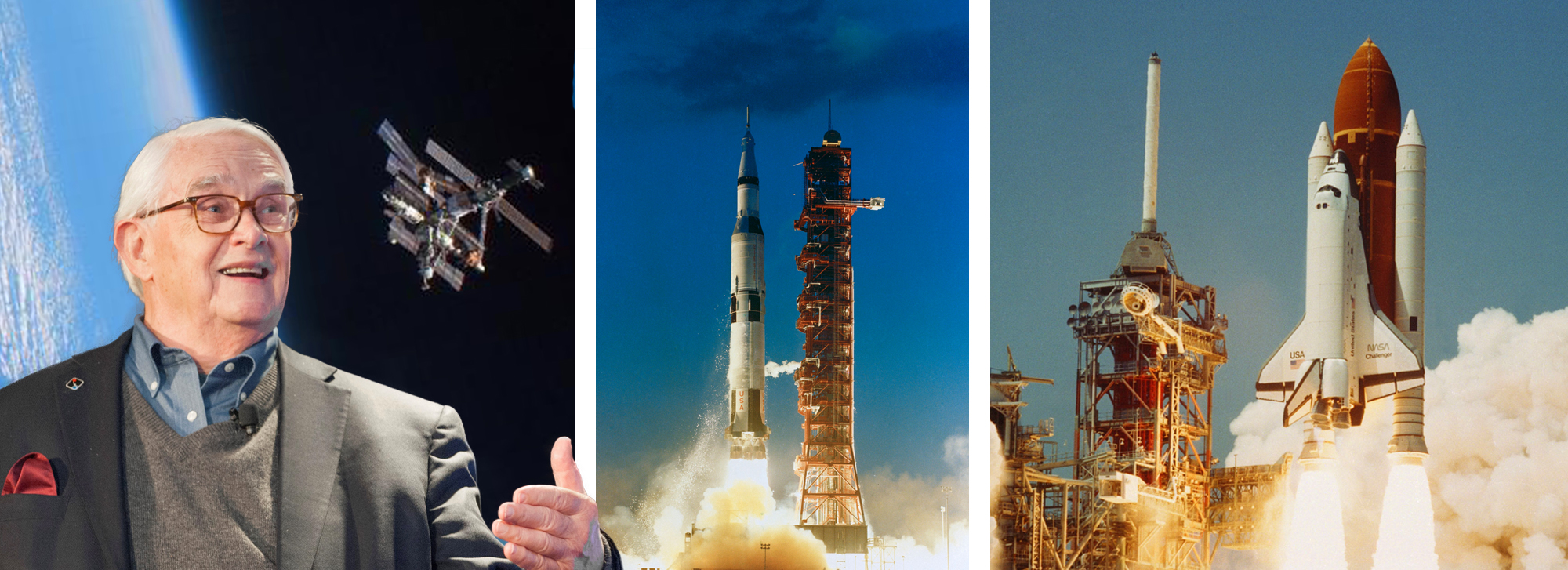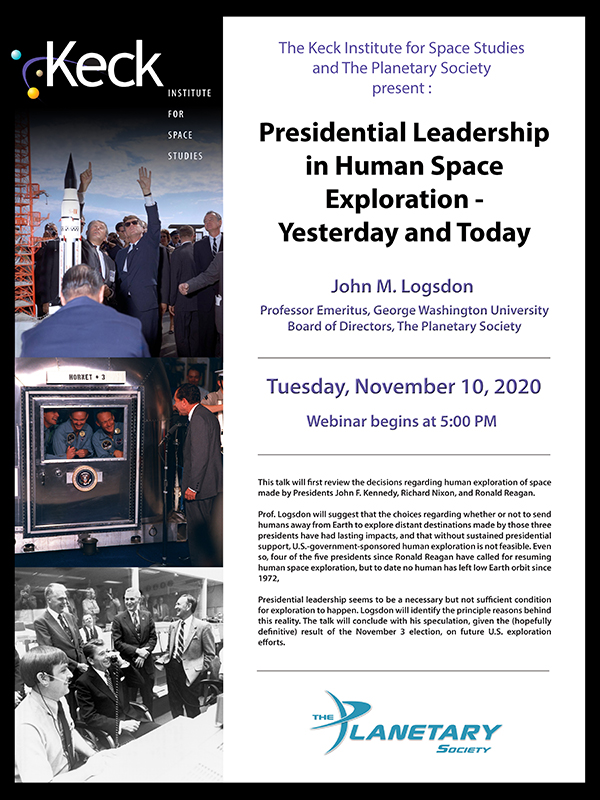

Presidential Leadership in Human Space Exploration Yesterday and Today
Speaker: John M. Logsdon
Professor Emeritus of Political Science and International Affairs, Space Policy Institute, Elliott School of International Affairs, George Washington University;
Board of Directors, The Planetary Society
Tuesday, November 10, 2020
5:00 P.M. Lecture
This lecture is sponsored by The Planetary Society and the W. M. Keck Institute for Space Studies
Abstract:
This talk will first review the decisions regarding human exploration of space made by Presidents John F. Kennedy, Richard Nixon, and Ronald Reagan. This portion of the talk will be based on my three books tracing those decisions. I will suggest that the choices regarding whether or not to send humans away from Earth to explore distant destinations made by those three presidents have had lasting impacts, and that without sustained presidential support, U.S.-government-sponsored human exploration is not feasible. Even so, four of the five presidents since Ronald Reagan have called for resuming human space exploration, but to date no human has left low Earth orbit since 1972, Presidential leadership seems to be a necessary but not sufficient condition for exploration to happen. I will try to identify the principle reasons behind this reality. The talk will conclude with my speculation, given the (hopefully definitive) result of the November 3 election, on future U.S. exploration efforts.
Speaker's Biography:
Dr. Logsdon is Professor Emeritus of Political Science and International Affairs at George Washington University’s Elliott School of International Affairs. Prior to his leaving active faculty status in June 2008, he was on the faculty of the George Washington University for 38 years; before that he taught at the Catholic University of America for four years. He was the founder in 1987 and long-time Director of GW’s Space Policy Institute. He was also a faculty member of the International Space University from 1988-2020. He holds a B.S. in Physics from Xavier University (1960) and a Ph.D. in Political Science from New York University (1970).
Dr. Logsdon’s research interests focus on the policy and historical aspects of U.S. and international space activities. His 2010 book, John F. Kennedy and the Race to the Moon, was named the 2011 winner of the Gardner Lasser Aerospace History Award of the American Institute of Aeronautics and Astronautics and co-winner of Eugene M. Emme Astronautical Literature Award of the American Astronautical Society. His 2015 book, After Apollo? Richard Nixon and the American Space Program, was selected as the 2017 recipient of the AIAA Gardner-Lasser award. His 2019 account of civilian space decisions during the Reagan administration, titled Ronald Reagan and the Space Frontier, won the AAS Emme Award in 2020. He is the editor of the 2018 Penguin Classics compilation The Penguin History of Outer Space Exploration: NASA and the Incredible Story of Human Space Exploration. Dr. Logsdon is also general editor of the seven-volume series Exploring the Unknown: Selected Documents in the History of the U.S. Civil Space Program (1995-2008). He has written numerous articles and reports on space policy and history. He is frequently consulted by the electronic and print media for his views on space issues and has appeared as an expert on all major television networks and public radio.
Dr. Logsdon is a long-time member of the Board of Directors of The Planetary Society. In 2003 he served as a member of the Columbia Accident Investigation Board. During 2008-2009, he held the Charles A. Lindbergh Chair in Aerospace History at the Smithsonian Institution National Air and Space Museum. He was a member of the NASA Advisory Council from 1998-2001 and from 2005-2009. He is a recipient of the Exceptional Public Service, Distinguished Public Service, and Public Service Medals from NASA, the 2005 John F. Kennedy Astronautics Award from the American Astronautical Society, the 2006 Barry Goldwater Space Educator Award from the American Institute of Aeronautics and Astronautics, the 2013 Frank Malina Space Educator Award from the International Astronautical Federation, and the 2019 Ordway Award for Sustained Excellence in Spaceflight History from the American Astronautical Society. He is a Fellow of the American Institute of Aeronautics and Astronautics, the American Astronautical Society, and the American Association for the Advancement of Science, and a member of the International Academy of Astronautics.

